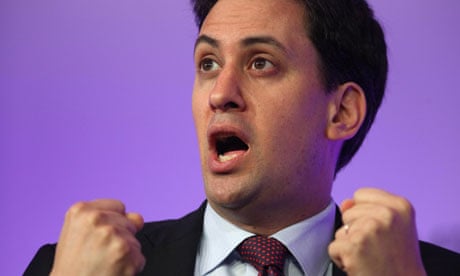Ed Miliband has demanded the breakup of Rupert Murdoch's UK media empire in a dramatic intervention in the row over phone hacking.
In an exclusive interview with the Observer, the Labour leader calls for cross-party agreement on new media ownership laws that would cut Murdoch's current market share, arguing that he has "too much power over British public life".
Miliband says that the abandonment by News International of its bid for BSkyB, the resignation of its chief executive, Rebekah Brooks, and the closure of the News of the World are insufficient to restore trust and reassure the public.
The Labour leader argues that current media ownership rules are outdated, describing them as "analogue rules for a digital age" that do not take into account the advent of mass digital and satellite broadcasting.
"I think that we've got to look at the situation whereby one person can own more than 20% of the newspaper market, the Sky platform and Sky News," Miliband said. "I think it's unhealthy because that amount of power in one person's hands has clearly led to abuses of power within his organisation. If you want to minimise the abuses of power then that kind of concentration of power is frankly quite dangerous."
The move takes Miliband's campaign against the abuse of media power to new heights after a fortnight in which he has reinvigorated his own leadership by leading the attack on the Murdoch empire. While he insisted that the recently announced inquiries should take their course, the Labour leader said he hoped the main parties could agree on a common approach.
His latest intervention, as a poll on Saturday night showed his personal rating up seven points on a month ago, comes ahead of what promises to be a dramatic appearance by Rupert Murdoch, his son James, the chief executive of News Corporation Europe and Asia, and Brooks before the Commons culture, media and sport committee.
Committee members preparing to grill the trio are to be given legal advice on the morning of the hearing on how far they can push the News Corp boss and his son for answers. The committee's chairman, the Tory MP John Whittingdale, has asked for details of their lines of questioning to avoid duplication.
News Corp is understood to be concerned that the committee will set a trap by asking questions the Murdochs are unable to answer due to the continuing criminal investigations and are taking advice on how to avoid yet another public relations disaster as the company attempts to rebuild its reputation.
Further pressure was piled on Murdoch after the Liberal Democrats wrote to the media regulator, Ofcom, urging it to launch an investigation that could see his holding company, News Corp, forced to sell its stake in satellite broadcaster BSkyB.
The Broadcasting Act places a duty on the regulator to consider "any relevant conduct of those who manage and control such a licence".
Although News Corp, whose News International subsidiary owned the News of the World, has only a minority 39% share in BSkyB, the Lib Dems argue the company is "strongly placed materially to influence the policy and strategic direction of BSkyB", suggesting the regulator is duty bound to investigate.
Simon Hughes, the Lib Dem party's deputy leader, Don Foster, its media spokesman, and Tim Farron, its president, are demanding that the watchdog's members "take measures now to satisfy yourself that the owners of the BSkyB licence continue to be 'fit and proper'", given "the manifest public concern about News International's activities, the close integration of News International with its parent company News Corporation, [and] News Corp's effective control of BSkyB".
The three dismissed claims that the regulator could not act while criminal investigations were current, saying there were "no legal reasons to stop Ofcom from conducting its work alongside that done by the police".
A spokeswoman for Ofcom said: "We received this letter early on Friday evening. We will be considering our response next week."
She added that the regulator was continuing to gather information, which it hoped would assist in the discharge of its duties. "We have already written to a number of relevant authorities and can confirm that follow-up meetings will now be taking place."
In his interview Miliband said that once a Sunday Sun was launched, possibly in August, this would add further to the Murdoch empire's penetration of the UK media market.
Meanwhile, the foreign secretary, William Hague, defended David Cameron's regular meetings with News International executives and his decision to invite Andy Coulson, his former director of communications who was arrested 10 days ago, to Chequers several weeks after Coulson's resignation over the phone-hacking scandal.
"In inviting Andy Coulson back, the prime minister has invited someone back to thank him for his work – he's worked for him for several years – that is a normal, human thing to do," Hague told BBC Radio 4's Today programme. "I think it shows a positive side to his character."
He added: "Personally I'm not embarrassed by it in any way – but there is something wrong here in this country and it must be put right. It's been acknowledged by the prime minister and I think that's the right attitude to take."
Hague continued: "It's not surprising that in a democratic country there is some contact between leaders of the country, and indeed opposition leaders, and indeed I believe on that list of meetings there are also meetings with the executives of the Guardian and Trinity Mirror and whatever other news organisations."
Cameron has acknowledged that he met Coulson since his resignation, but "not recently and not frequently".
"When you work with someone for four years as I did, and you work closely, you do build a friendship and I became friends with him," the prime minister said.
